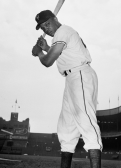Respect, recognition: Big leaguers on Negro Leagues stats entering record
Bud Black has read the stories. He’s seen the classic clips. The Rockies' manager knows a lot about some of the great baseball players who spent time in the Negro Leagues -- players like Josh Gibson and Satchel Paige.
So when Black heard that statistics from the Negro Leagues had been incorporated into MLB’s historical record, he was all for it.
“I was excited by the recognition that the Negro Leagues players are receiving,” Black said before Wednesday’s game against the Guardians. “I think that's the thing that is important: that these great players that we've heard about, that we've seen on some old-time video are finally being recognized for their talents and their statistics.”
The changes put Negro Leagues stars on equal statistical footing with American and National League players, something that wasn’t the case when Black players were barred from playing in the AL and NL before Jackie Robinson broke the color barrier with the Dodgers in 1947. For example, Gibson -- a standout catcher for the Homestead Grays and Pittsburgh Crawfords -- is now MLB’s all-time leader in batting average, slugging percentage and OPS, and he holds the all-time single-season records in each of those categories.
It’s not just Gibson, though. Wednesday’s announcement will go a long way toward highlighting the names of many Negro Leagues stars.
Negro Leagues stats enter record
• Everything to know as Negro Leagues stats join MLB record
• Gibson's incredible talent transcends even his legend
• Here are the top changes to statistical leaderboards
• Stat changes for 8 Hall of Famers who got their start in Negro Leagues
• 10 hits added to Mays’ ledger, but HR total stays at 660
• Baseball’s record books are changing, and that’s nothing new
• Findings from Negro Leagues Statistical Review Committee
• Updated all-time MLB leaderboards: Hitting | Pitching
• Official MLB press release
• Complete Negro Leagues coverage
"You get to learn about a lot of names and a lot of people that we may not have heard about," Pirates outfielder Andrew McCutchen told the Associated Press. "Now that Josh Gibson is at the top of OPS and batting average and a few other categories, it's great news. But it's more than just that and the numbers. It's great that you now get to learn about the players in the Negro Leagues. ... I'll be able to do some more deep diving into some names that I may not have heard of."
Yankees manager Aaron Boone agreed, saying the decision would allow fans, players and coaches to get more context on stars (Boone mentioned speedster James “Cool Papa” Bell) and get to know some new players as well.
“Maybe this shines a light on even some more great players that aren't necessarily household names from the past,” Boone said.
White Sox assistant general manager Josh Barfield acknowledged there would likely be controversy about MLB’s decision, which significantly changes many all-time statistical leaderboards.
But according to Barfield, being able to validate the experience of Negro Leagues stars makes the change a good one.
“Part of what makes this game so special is the preservation of the numbers, the records and things like that,” Barfield said. “So I can understand where people are coming from, [those who] might have issues with it. But at the same time, the caliber of players that were in this league, it’s hard to deny that if it wasn’t the Major Leagues, it was very, very close as far as night-in, night-out competition.”
Seven Negro Leagues from 1920 to '48 were officially recognized as Major Leagues in 2020, and Wednesday’s announcement is another step toward affording the Negro Leagues equal status with the AL and NL.
Brewers manager Pat Murphy said the issue is “sensitive to me for a lot of reasons.”
“Sensitive, meaning that I just think it’s awful they weren’t allowed to go out and play,” Murphy said. “That’s just an awful thing. So, this is a statement saying that we recognize that. We recognize that it was a gross injustice.”
According to AP, Reds pitcher Hunter Greene called the move “overdue,” a sentiment echoed by Black.
“It's been talked about for a long time,” Black said. “Me, personally, I've known about these players and I've read about them. So I think probably a little bit overdue that now finally it's going to be in our record books of our great game of baseball.”
Ahead of his standout game against the Cubs, Brewers outfielder Blake Perkins said he hadn’t yet seen the news, but he was glad to hear it.
“I wasn’t even aware that it was happening, but now that I am aware, I think it’s a positive thing for our game,” Perkins said. “I think it’s just bringing light to the players who came before us and giving them the respect that I think they rightly deserve.”
The move will put a spotlight on Negro Leagues stars who were good enough to play in the NL or AL, but who were excluded due to their race -- such as Oscar Charleston, Turkey Stearnes, Buck Leonard and others.
For Angels manager Ron Washington, that’s as good a reason as any to make a change -- even if it was overdue.
"It's significant, because there are some players in the Negro Leagues that could have dominated the National and American Leagues when they played,” Washington said. “It took some time, but in time, good things happened. Very good."
Reporters Scott Merkin, Bryan Hoch, Rhett Bollinger, Thomas Harding and Adam McCalvy contributed reporting for this story.

